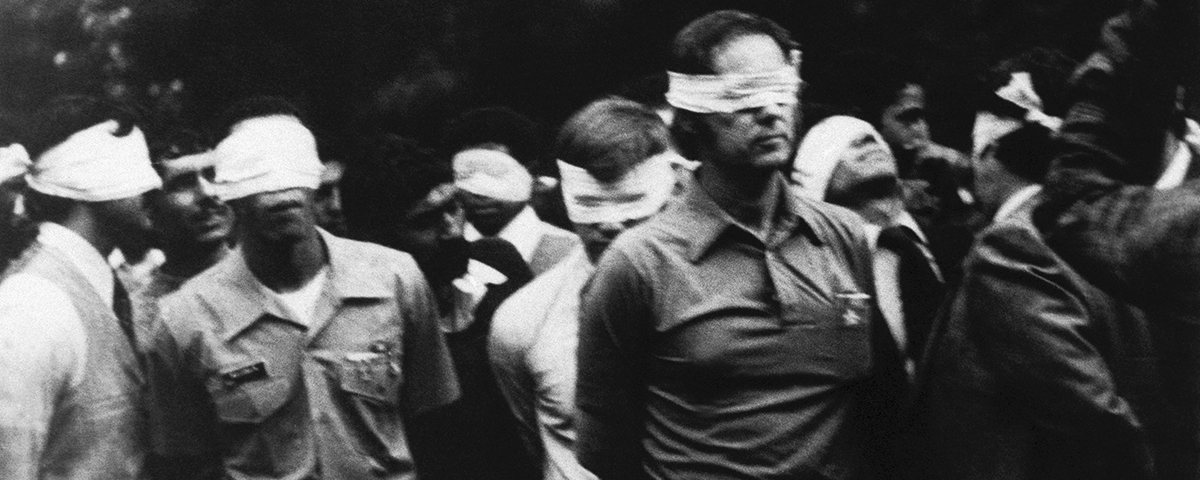Born in 1957 in suburban St. Louis, Mo., Rodney V. “Rocky” Sickmann enlisted in the Marines in 1975 in the wake of the Vietnam War. He spent a few years in the infantry before joining the Marine Corps Security Guard Battalion (present-day Marine Corps Embassy Security Group), which watches over U.S. Embassies worldwide. In October 1979 Sergeant Sickmann was posted to the embassy in Tehran, Iran. Weeks later, on November 4, radical Islamic students stormed the compound and took Sickmann and 51 other Americans captive. Over the next 444 days he and his fellow hostages endured privation and torture as officials sought their release. On April 24, 1980, eight U.S. servicemen died during a failed rescue attempt known as Operation Eagle Claw. To secure the hostages’ release, President Jimmy Carter’s administration signed an accord on Jan. 19, 1981, that among other concessions removed a freeze on nearly $8 billion in Iranian assets and included a pledge “not to intervene, directly or indirectly, politically or militarily, in Iran’s internal affairs.” The next day, within minutes of Ronald Reagan’s inauguration as U.S. president, Iran released the hostages. Soon after arriving home, Sickmann left the Marines for a successful career in sales. He now works for Folds of Honor, a nonprofit that provides scholarships to the children and spouses of U.S. military men and women disabled or killed in service to their country.

Describe the embassy attack.
The Iranians had been demonstrating because the United States had admitted the shah. There was a demonstration again that day in front of the embassy. I’d planned to run errands in town and was walking down to the motor pool when my walkie-talkie blared “Recall! Recall!” The demonstrators were coming over the main entrance gate, and the Iranian guards who were supposed to be protecting us walked away like nothing was happening.
I ran back to the embassy. Billy Gallegos, a fellow Marine security guard, was sealing down the building, securing it with steel doors. He kept it open long enough for me to get in. Then we donned our gas masks and flak jackets and retrieved our shotguns and snub-nosed .38s. My adrenaline was pumping. At the same time I was concerned. There were only a couple of us in the embassy.
How did they gain entry to the chancery?
As I watched, the Iranians approached, holding signs with messages like This Is a Peaceful Demonstration. Then they were pounding on the front door, and I heard they’d gained access to the basement. So I ran downstairs, and around the corner through smoke and debris come four Iranian women being forced forward by Iranian men. That’s when we start hearing orders: “Don’t fire! Don’t antagonize! Help is on the way.” So we withdrew upstairs behind the steel doors.
Smoke was coming in under the door, as we had popped tear gas. Then the attackers started bringing Americans to the door. There we were, safe on the other side, and we’d hear someone on the other side yell, “They’ve got a gun to my head, and if you don’t open the door, they’re going to kill me!” Then they’d bring another person begging for his or her life.
Somebody was in communication with the White House or State Department, and they were asking what was happening. At that point we were ordered to give ourselves up, and the government would resolve things diplomatically. That was Nov. 4, 1979, and we weren’t released until Jan. 20, 1981. So that morning 52 Americans were stripped of their freedom, dignity and pride for 444 days.
Do you wish you had opened fire?
After being taken, yes. But it’s the military: You receive orders, and you execute orders. In retrospect, had we fired on the Iranian women, the men would have paraded their bodies outside, claiming the Marines had shot unarmed, innocent women. Then they would have all come unglued. We probably would have gotten everybody killed.
But the problem is that we didn’t do anything, and Iran has used that same approach to continue to fight us. We’re not fighting an enemy in uniform. We’re fighting people in plain clothes that use different means than we do.
Did your captors single out you and your fellow Marines?
At the beginning we were all separated—none of us saw everyone again until released on Jan. 20, 1981. A picture of every Marine was up on the wall of our post, so they knew who we were. They wanted us to make derogatory statements and made it pretty rough. We just gave them name, rank and serial number.
What sort of torture did you and the others endure?
Mental, physical and psychological.
I knew there was a fleet on standby in the Mediterranean, as I was on that fleet when the embassy was attacked in February 1979. So I’m sitting there on the first day, thinking, Hey, those guys are coming to get us—they’re coming to rescue us. The first day comes, the second.…The first month was pretty tough. Imagine 444 days.
At first we were handcuffed, hands behind our backs. We sat like that for hours, sometimes days. I spent an entire week tied in a bed. We went outside seven times, 15 minutes total, in those 444 days. We don’t even treat our war prisoners like that.
The worst time was the night they stripped us from our room, took us down the hallway and put us up against the wall, an Iranian behind each of us with a weapon. They’re all screaming. You think it’s a rescue operation, and you’re thinking, This is it. Because they always told us, “If the United States comes, you will die before they get to you.”
You’re in a foreign country, 7,000 miles from home. You’re not allowed to talk to anybody. Your mind plays game after game. You don’t know if you’re going to live or die. You hate everybody, yourself, your government. Trust me, it is one of your worst nightmares, something you don’t ever forget.
How did you withstand the ordeal?
Thank God for my wonderful childhood, my parents, how they brought us up. They taught us love of country, respect for the flag, love of family and religion. I’ve never prayed so hard in my life.
What stays with you?
Eight people lost their lives trying to regain my freedom. How does anybody forget such people?
Did the government revise embassy security procedures?
In the Embassy Security Group are regional groups of Marines. Whenever they hear of a hostile act in a foreign country, these reaction-force Marines are brought in to help provide security. And in 1987 Congress created the Special Operations Command to help prevent another failed rescue attempt.
But then Benghazi happened. These guys were calling for help—there were supposed to be measures in place. How could that have happened with such precautionary measures in place?
‘The War on Terror started Nov. 4, 1979, when the Iranians took our embassy, and we didn’t do anything about it’
Do you agree with how U.S. officials handled the crisis?
President Carter was a kind, good man. But Iran ate him up. They just used him. The Iranians told me, “It is not you we hate, it’s your government—but we will use you to humiliate your government.” And they did exactly that to Carter. He tried a rescue attempt—that failed. He then tried to negotiate. The day they paid that $8 billion is the day that they fed the animal—and he’s going to want to be fed again.
Should the United States negotiate with terrorists or the nation-states that support them?
Never. I truly believe the War on Terror started Nov. 4, 1979, when the Iranians took our embassy, and we didn’t do anything about it. Since then they have rubbed it in our face one incident after another, and we’ve never held them accountable.
The radical Islamic mullahs have been in power since 1979. We change power every four to eight years, and they know that. We get a new president, they tell him, “We’re going to negotiate,” and then they drag him through the wringer. So we get hung up, and nobody remembers the past.
How should we handle Iran?
Sanctions work pretty well. We should tighten them to the point it makes them squirm. Instead, we just gave them all this money. I don’t think it’s going toward solving poverty in Iran, and I don’t think it’s going into human rights. It’s paying for other terrorist events around the world.
How many times do you allow the schoolyard bully to push you around? It’s got to stop.
Why does radical Islamic terrorism persist?
I truly believe a Muslim is not born with hatred—they’re taught hatred. Every morning back in 1979 the cars would start honking, and the demonstrators would chant, “Death to America!” Young Iranian children who had never been in America, never met an American, were being taught to hate America. That teaching is infiltrating into our society.
You wonder why people around the world to this day are strapping themselves with C-4 and walking into a roomful of people? It’s because they’ve been taught hatred.
How do we protect ourselves?
We must vet each individual that comes into our country. On a personal level everybody must be aware of his surroundings. And if you see something happening, you must stand up. I’m always thinking, OK, if something happens, here’s what I’m going to do. Everybody needs to help each other.
We should be very thankful for what we have here in the United States of America. Not until it is stripped from you do you realize how wonderful life is here.





